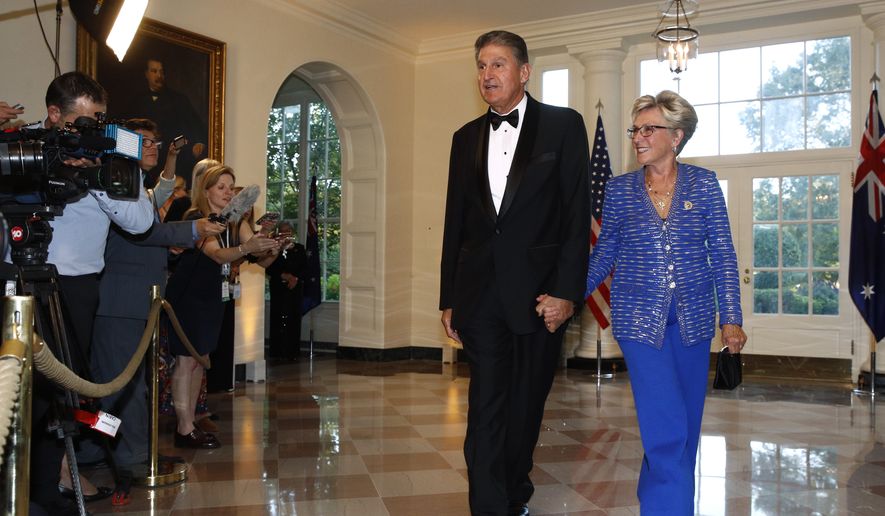President Biden intends to appoint the wife of the Senate’s top swing vote, West Virginia Democrat Joe Manchin III, to a plum federal position that pays upward of $160,000 annually.
The White House announced Friday that it would nominate Gayle Conelly Manchin, a former president of the West Virginia Board of Education, to serve as federal co-chair of the Appalachian Regional Commission.
Mrs. Manchin’s resume also shows her service as West Virginia’s first lady and West Virginia secretary of education and the arts, and her work on several other state boards and initiatives.
The Appalachian Regional Commission is responsible for promoting economic development and investment in the 13 states that span the region from northern Mississippi to Pennsylvania.
If confirmed by the Senate, Mrs. Manchin will replace Tim Thomas, a former staffer for Senate Minority Leader Mitch McConnell, Kentucky Republican. The role comes with an annual salary of approximately $163,000, according to a federal pay database.
Mrs. Manchin’s husband has become a vital political player in Washington for advancing Mr. Biden’s agenda and potentially a Democratic rewrite of the Senate’s filibuster rules.
Mr. Manchin has resisted fellow Democrats’ calls for eliminating the filibuster, which would allow Democrats to ram through their agenda without the support of a single Republican.
Government watchdog groups immediately questioned the appointment’s timing.
“Politicians use various inducements to get other politicians to change their minds on issues,” Peter Schweizer, president of the Government Accountability Institute, told The Washington Times. “Unfortunately, it often works all too well.”
Mrs. Manchin could decline the co-chair’s salary. Federal appointees with close familial ties to leading elected officials sometimes forgo their salaries to avoid any hint of a conflict of interest.
Jared and Ivanka Trump did not accept compensation for their roles in the White House during President Trump’s term in office.
Mr. Manchin’s Senate office did not respond to requests for comment about the nomination of Mrs. Manchin.
Despite the Democrats’ control of Congress and the White House, the party’s hold on the Senate is tenuous at best. The upper chamber is split 50-50 between the parties, and the Democrats hold the majority only because of Vice President Kamala Harris’ tiebreaking vote.
Given the narrow margin, Mr. Manchin, a self-described “moderate to conservative Democrat,” holds immense sway over whether the Biden administration’s agenda can become law. The senator wielded his influence earlier this month when he delayed passage of the American Rescue Plan until his fellow Democrats in the Senate agreed to reduce the size of some unemployment benefits.
He would be a key vote again for abolishing the Senate filibuster.
Under current Senate rules, any legislation that falls short of 60 votes can be filibustered by minority members. Eliminating the filibuster, one of the defining characteristics of the Senate, has become a point of internal division among Democrats. Without the filibuster, the Senate would diminish its deliberative nature and transform the upper chamber into a majority-dominated body similar to the House.
Democrats would need all 51 of their votes to change the Senate rules.
Liberals argue that the filibuster should not stand in the way of Mr. Biden’s agenda on voting rights, gun control and climate change.
Voting rights have become exhibit No. 1 in Democrats’ case for eliminating the filibuster. Senate Democrats have a sweeping electoral overhaul bill, the For the People Act, which would set national standards for elections.
Democrats argue that nationwide rules are crucial to counter Republican-controlled state legislatures that are moving to tighten election laws, as Georgia lawmakers did last week.
“We have to pass voting rights no matter what,” Sen. Raphael G. Warnock, Georgia Democrat, said when asked about the filibuster Sunday on CNN’s “State of the Union.”
Moderate Democrats including Mr. Manchin and Sen. Kyrsten Sinema of Arizona have balked at prior calls to jettison the filibuster.
In January, both lawmakers asserted their opposition to abolishing the filibuster when Democrats were negotiating with Republicans on how to organize the Senate. At the time, Mr. Manchin said he did “not support doing away with the filibuster under any condition” because it was “not who I am.”
Mr. Manchin’s opposition, however, seems to have softened. Earlier this month, the West Virginia Democrat floated the idea of mandating filibustering lawmakers to speak continuously on the Senate floor. Under current rules, senators have to only signal their intent to hold up a bill to prevent it from moving forward without 60 votes.
“The filibuster should be painful. It really should be painful, and we’ve made it more comfortable over the years,” Mr. Manchin said. “Maybe it has to be more painful.”
Still, the West Virginian insists he will never support the full abolition of the filibuster. Mr. Biden, though, appears hopeful that Mr. Manchin will reconsider.
“Well look, we’ll see, [the] question is whether or not you have to have 50 votes, 51 votes …right now that doesn’t exist,” Mr. Biden said Friday when asked about the filibuster. “So you know, look, the only thing I’ve been relatively good at in my long career in the Senate is figuring out when to move and when not to move. You’ve got to have the votes.”
• Haris Alic can be reached at halic@washingtontimes.com.




Please read our comment policy before commenting.